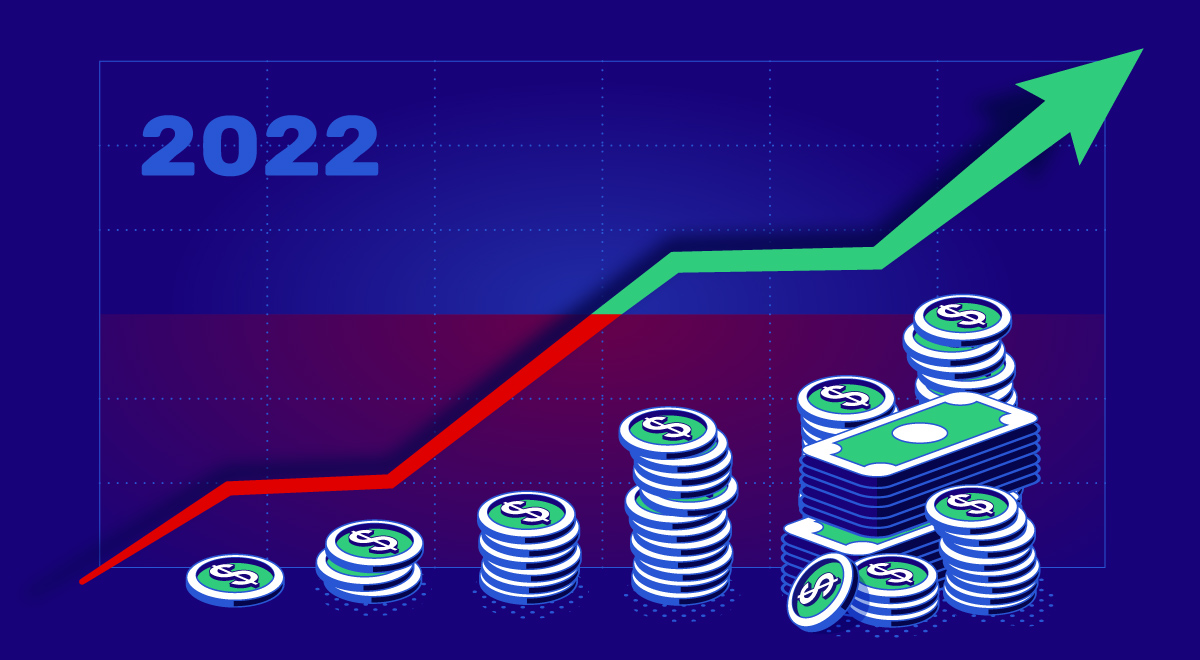A new year offers a chance for a fresh start on your finances. For some, that means trying to deflate ballooning credit card debt. Others may hope to save more for a home during 2022, or finally establish a long-delayed emergency fund.
Although the new year is already well underway, there is still plenty of time to make changes in your financial life that can pay off for many years to come. Following are six smart financial moves to consider making this year.
Ask For A Raise
For many years, workers had to dance to the tune of employers. Finding a good job was difficult, and competition was fierce for the best roles.
But the tide has turned. Today, employers are desperate to find quality workers. In the wake of the pandemic, many people have either retired early or simply quit working in what has been dubbed the Great Resignation.
That means you likely have workplace leverage now that you did not have in the past. Use it to improve your financial situation during 2022.
“The foundation of personal finance is income,” says Matt J. Goren, a Certified Financial Planner, assistant professor of financial planning and CFP program director at The American College of Financial Services.
Goren urges you to consider using this year to ask for a raise, look for a new job or pick up a side hustle.
“Nothing else — including cutting expenses, investing, or paying off debt, — will change your financial and personal life as much as getting paid more,” he says.
Create A Budget
Building a budget – and sticking to it – is a bit like eating your peas and carrots: You know it’s good for you, but it’s not a lot of fun.
Alas, too many people look at building a budget as restricting them from spending on the things they enjoy. In reality, a budget enforces discipline on your spending that allows you to save more, which in turn eventually gives you more freedom over your finances.
It appears that a growing number of Americans now understand the value of having a budget. A 2021 Debt.com survey found that 80% of Americans have a budget, a jump from 68% in 2019.
Such budgeting can pay big off big. In the Debt.com survey, 88% of respondents said having a budget got them out of debt, or kept them out of the red.
The biggest challenge in establishing a budget is often finding and organizing your most important data, according to Goren. “Free budgeting apps like Mint can make this much easier,” he says
A little short-term pain in early 2022 can lead to major financial gains for the rest of the year – and far beyond.
Pay Down Debt
Millions of Americans are deeply mired in debt. And the situation is only getting worse.
As 2021 came to a close, consumer debt in the U.S. stood at $15.6 trillion, a new record, according to data from the Federal Reserve’s New York district. The amount of debt increased by $1 trillion over the course of the year, also a record.
For millions of people, the problem could soon get much worse unless they make smart money moves.
The Federal Reserve is forecast to hike its target federal funds rate several times this year. When that happens, rates on credit cards and some types of mortgages will increase, making those debts even more expensive.
So, now is the time to eliminate debt. “Check your debt-consolidation options with a local credit union,” Goren says. “Or, see if you qualify for a balance-transfer credit card with a long 0% interest introductory period.”
Consider A Mortgage Refinance
Another way to free up money if you are deeply in debt is to refinance your mortgage to a lower interest rate.
“If you’re in debt because of a big expense in the past, like an education or a medical bill, consider refinancing,” Goren says.
In recent years, mortgage rates have fallen to historic lows. That has allowed people to refinance their home with better loan terms. This significantly lowers their monthly payment and gives them more cash each month to spend on other things.
Even better, some people take that extra money and save it for future goals.
If you plan to refinance, check your credit report to make sure there are no errors. By law, you are entitled to look at one free credit report per year from the big three credit-reporting agencies – Equifax, Experian and TransUnion. These three agencies are offering free credit reports weekly through the rest of 2022.
If you find an error in your credit report, request that it be fixed. A clean credit report will result in a better credit score, which will help you to get access to the best mortgage rates from lenders. If you plan to refinance, it likely makes sense to do it quickly. “Interest rates are still very low, but that won’t last much longer,” Goren says.
Build An Emergency Fund
One of the reasons Americans fall so deeply into debt is because they do not have an emergency savings to cover expenses that arise unexpectedly.
Just 4 in 10 Americans say they have the savings to cover an unplanned expense that costs $1,000, according to a recent Bankrate survey.
Those who don’t have the money at hand when an emergency strikes are often forced to borrow expensively so they can foot the bill. Repeatedly turning to credit cards or personal loans to cover such expenses can quickly leave you trapped in a rolling snowball of high-interest monthly payments. So, try to build an emergency fund in 2022. Many experts suggest keeping six months’ worth of savings – or more – in a safe, highly liquid account, such as a savings account. Tap this money when the refrigerator suddenly dies, or if you need money for a down payment when your aging jalopy finally gives out.
Save More For Retirement
Everyone knows that having a retirement plan should be one of our biggest financial priorities. Yet, most of us put off this task until it’s far too late. If we wait too long, we face a steep uphill climb to reach our financial goals.
About one-quarter of adults have no retirement savings, according to a report from PwC. The median retirement account balance for those between the ages of 55 and 64 — within hailing distance of their golden years — is a paltry $120,000.
So, if you are young, learn from the mistakes of your elders and start saving today. Tiny amounts saved now can grow into a large nest egg over time.
If you are older, you face a more significant challenge. But it’s never too late to start saving – every dime counts.
The key to saving more for retirement is to pay yourself first, according to Goren.
“If you are only trying to save at the end of the month or year, you may find the money is already gone,” he says.
Instead, try to set money aside in a retirement account before spending on anything else.
“If you get an employer match, a 401(k) is a good place to start,” Goren says. “Otherwise, consider a Roth IRA. If necessary, you can take your contributions back out without penalty.”
Whatever your money goals are this year, it is important to carefully craft the right plan to achieve them. Without a good roadmap, you are unlikely to reach your destination.
At National Debt Relief, we take pride in empowering people to regain their financial stability through our proven debt relief program. Contact us and talk to a financial expert who will work with you to find the best option to settle your debt and help you achieve financial independence.







